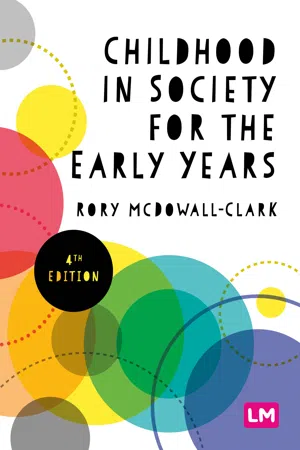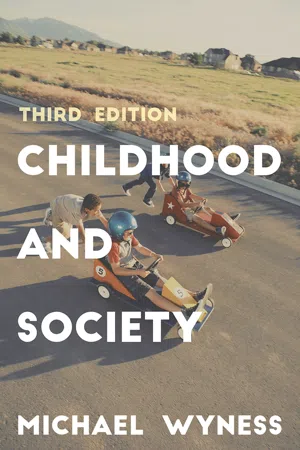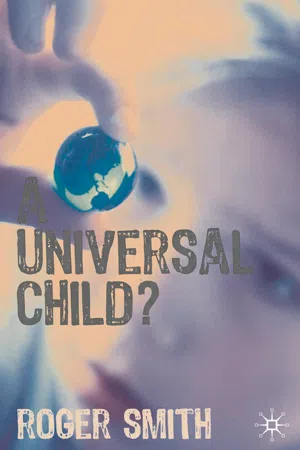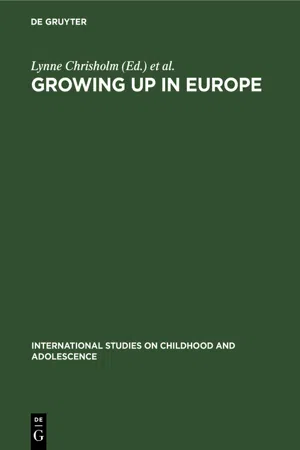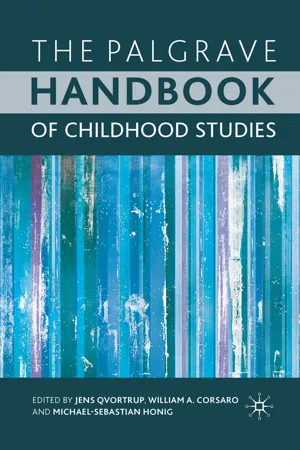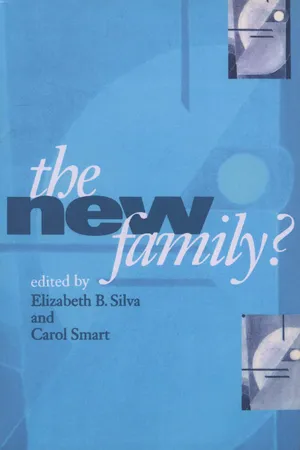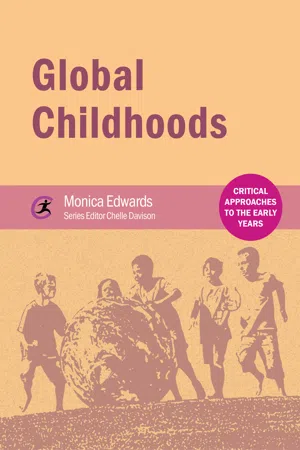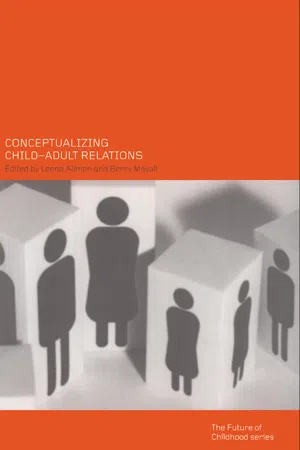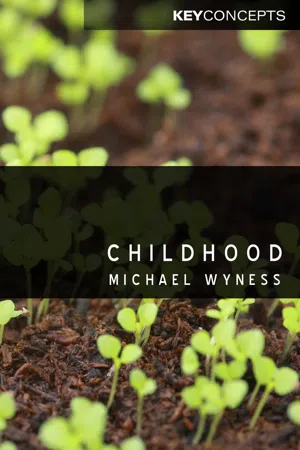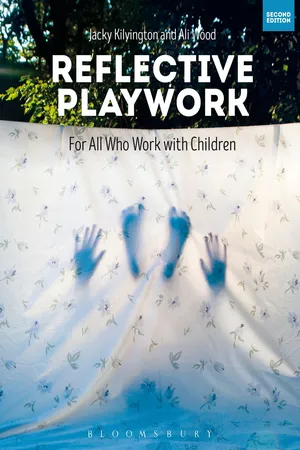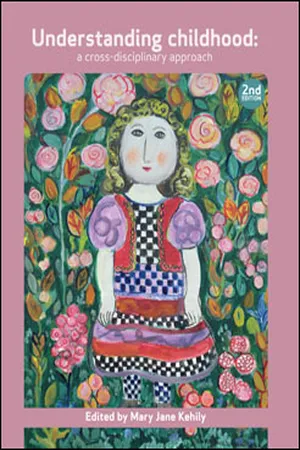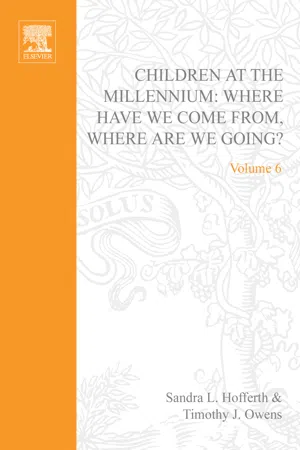Social Sciences
Children and Childhood
"Children and Childhood" refers to the study of the social, cultural, and psychological aspects of children's lives and experiences. It encompasses the examination of children's development, rights, and roles within families and societies. This field of study explores how childhood is constructed and understood within different historical, cultural, and social contexts.
Written by Perlego with AI-assistance
Related key terms
1 of 5
12 Key excerpts on "Children and Childhood"
- eBook - ePub
- Rory McDowall Clark(Author)
- 2020(Publication Date)
- SAGE Publications(Publisher)
1 The context of childhood: social understanding of childhoodThrough reading this chapter, you will:- consider the difficulty of defining ‘childhood’ and how we determine who is considered to be a ‘child’;
- examine the conflict and ambiguities that are raised by these questions;
- understand why the social context is so critical to an understanding of childhood.
Introduction
Until the final decades of the twentieth century the idea of childhood as a distinct and separate social category had been paid very little attention. Ideas about children have abounded throughout history (and will be explored further in Chapter 2 ) but children themselves were rarely considered important enough to warrant deliberate study. By the eighteenth century scientists, philosophers and educators had begun to systematically study children and build up knowledge about them. Since then, ideas about how children grow, the developmental stages they go through and different theories of how language is acquired have emerged as subjects of study within such fields as psychology, education and health. Thus, there is now a well-established body of knowledge known as child development which is studied by all those interested in working with children. Until the last few decades, the existence of a stage in human lifespan, called ‘childhood’, was simply taken for granted, however, and the concept itself was rarely examined or questioned. Today, a distinct interdisciplinary field called ‘childhood studies’ exists, uniting different approaches from diverse academic disciplines to bring the spotlight to bear, not only on children themselves but also on childhood as a unique social category.What is childhood?
Every adult was once a child; it is the one defining characteristic that each of us has in common regardless of the myriad differences that make us unique individuals. This ought to make it a fairly simple matter to understand exactly what childhood is and what the term signifies. However, the more we try to pin down and identify what we mean by childhood, the more slippery a concept it turns out to be. The difficulties this presents help to illustrate why childhood is a cultural and social invention and why it is so important to understand the context of childhood. - eBook - PDF
- Michael Wyness(Author)
- 2019(Publication Date)
- Bloomsbury Academic(Publisher)
PART THEORISING AND RESEARCHING Children and Childhood 1 7 THE SOCIAL MEANING OF CHILDHOOD Introduction We all have experience of childhood, not only as children but also in bringing up children, working with children or simply being members of a society that values childhood. Children are a common part of our physical and social landscape. Our culture and values nowadays are suffused with memories, experiences and symbols of childhood and all things ‘childish’. Moreover, we think of childhood as a natural and inevitable phase that we all go through before we reach adulthood. We may be forgiven, then, for taking Children and Childhood for granted. Given this situation, we are rarely asked what childhood is or how it relates to children. If we are pushed to define childhood, the invocation of ‘nature’ directs us towards thinking about children’s ‘natural’ biological incapacities. Children are physically smaller and weaker than adults. Common sense tells us that their size and stature are visible markers of difference. This is an unexceptional observation in itself, for no one would deny that children are not as fully developed biologically as adults. We assume that this smallness becomes increasingly less significant as children move through childhood into adulthood. Childhood is thus commonly associated with this smallness. ‘Children’ and ‘childhood’ here are seen as aspects of the same thing; children being the grounded and physical manifestations of childhood. It is then a quick step to deducing childhood from what we commonly experience in society: children. Children’s physicality is what also seems to characterise children’s minds and identities; throughout most of the twentieth century, at least in Western societies, the idea that children’s physical immaturity determines their social identities has been built into our way of thinking such that it assumes the status of fact. - eBook - PDF
- Roger Smith(Author)
- 2009(Publication Date)
- Bloomsbury Academic(Publisher)
The nature and experience of childhood thus constitute a hotly contested and highly politicized issue. 12 Theoretical Aspects of Childhood It is one that is further complicated by the necessary distinction between ‘childhood’ and ‘children’. ‘Childhood’ can be conceptual-ized as a process and a life stage, which may or may not be socially constructed and mediated. ‘Children’ comprise the population of young people (for present purposes, all those under the age of 18) who live through this phase of human existence, experiencing it dif-ferently depending on their individual characteristics, experiences and social contexts. The distinction between the two forms of cat-egorization is made across and between a variety of academic dis-ciplines, being captured by one social historian as the difference ‘between children as human beings and childhood as a shifting set of ideas’ (Cunningham, 1995, p. 1). In relation to historical discourses, this is clearly an important dif-ferentiation to make. It is easier to provide an account of how child-hood has been defined and viewed from adult perspectives, because adult accounts tend to be the source of available evidence, than to describe directly how children actually lived in specific eras, or changed and developed during the course of their lives. Their own accounts are much less readily accessible, despite the survival of a ‘scattering’ of material of this kind (Cunningham, 2006, p. 74). Anthropologists, on the other hand, may be able to offer different and distinctive insights into these questions because of the greater ease with which they are able to gain access to children’s first-hand accounts or cultural productions. Thus, it is immediately apparent that quite fundamental definitional issues reflect differing and sometimes competing perspec-tives and modes of understanding of Children and Childhood, in both academic and social and political spheres. - eBook - PDF
Growing up in Europe
Contemporary Horizons in Childhood and Youth Studies
- Lynne Chrisholm, Peter Büchner, Heinz-Hermann Krüger, Manuela du Bois-Reymond, Lynne Chrisholm, Peter Büchner, Heinz-Hermann Krüger, Manuela du Bois-Reymond(Authors)
- 2020(Publication Date)
- De Gruyter(Publisher)
Conclusions This contribution has chosen to approach the development and characteristics of the social scientific study of childhood primarily from a methodological point of view. Neither the approach taken, nor the conclusions reached, nor the specification of the direction in which it is desirable to move, will find full or universal agreement amongst those actively involved in the field - nor is such consensus necessary to proceed further. Yet, I think that most active researchers in the field do agree about at least three requirements: firstly, that the focus must be on children or childhood; secondly, that this focus must exhibit features that are non-developmental in the sense of privileging the characterisation of some kind of collectivity of children - be that at a specific level or a general societal level; and thirdly, such research should - directly or indirectly - relate to some reference group, be that along a generational dimension or some other comparative category. Substantially speaking, theories, that characterise childhood inter alia in terms of a minority group, marginalisation, paternalisation (Qvortrup 1994), institutionalisation, or Verhauslichung (Zinnecker 1990a) are promising and fruitful since they may be organi-cally conceived of in terms of more general theories about societal modernisation. This would therefore also stress one last important point, namely that, in my view, children or childhood should not be regarded as something separate from society, as something Childhood in Europe: a New Field of Social Research 19 mysterious, as were they an ontologically different species. Children are human beings, and not merely human becomings; they cannot be seen as 'persons-to-be' who must be integrated into society. If childhood is, then, an integral part of society, it is equally a legi-timate and desirable subject of social scientific inquiry in the same fundamental manner as is any other social phenomenon. - eBook - PDF
- J. Qvortrup, W. Corsaro, M. Honig, J. Qvortrup, W. Corsaro, M. Honig(Authors)
- 2016(Publication Date)
- Palgrave Macmillan(Publisher)
Childhood was conceptualized Method and Methodology in Childhood Research 79 as historically contingent and socially constructed and, more importantly, as a central element of social structure. Furthermore, children were seen as active in the permanent social reproduction of everyday life, of children’s culture and of society. The main objects of sociological childhood research have changed fun- damentally (for recent reviews see Kränzl-Nagl and Mierendorff, 2007; Matthews, 2007; Schweizer, 2007). Thus, it becomes necessary to think about research strategies and methodology to realize and implement these ‘new’ research agendas. Childhood is no longer solely seen, first, as a natural stage in the life course, or, second, as a secure stage of development, but as an element of social structure and as a social context of children’s lives. This context, and especially the sociality of this context, becomes one of the most striking features of, and a theoretical starting point for, research in the field of the ‘new sociology of childhood’ (James and James, 2004; Prout, 2005). This does not mean that ‘old’ methods and traditional knowledge about children have to be abandoned, but methodological access, the choice of methods and the interpretation of data have to be changed. In this context, it has to be mentioned that sociology as an academic discipline itself has not yet developed a very intense concern about the special aspects of researching children. In most textbooks about methods of social research, researching children is not even a topic (see, for example, Diekmann, 2007, for a quantitatively oriented textbook in the German context, and Flick, 2007, for a qualitatively oriented textbook). One of the important theoretical implications of this sociality is that child- hood as an element of social structure has to be understood in terms of its gener- ational order (Honig, 1999; Alanen and Mayall, 2001; Mayall and Zeiher, 2003; Qvortrup in this volume). - eBook - PDF
- Elizabeth Silva, Carol Smart, Elizabeth Silva, Carol Smart(Authors)
- 1998(Publication Date)
- SAGE Publications Ltd(Publisher)
10 RECONSIDERING Children and Childhood: SOCIOLOGICAL AND POLICY PERSPECTIVES Julia Brannen After many lean years, family life research in the UK has become something of a boom area. A focus on parenting, especially in the context of changing family forms, is a popular policy and academic topic. Even more recently there has been a surge of interest in childhood, especially work which examines the world from the perspective of children. Recently, research funding bodies have followed one another's example in supporting research in this area and with this perspective. The study of 'normal' childhoods, not only the problematic childhoods of the few, constitutes a growth area especially within sociology. 1 Sociologists' new interest in childhood has emphasized children's agency in the outside world, as well as inside families and other adult-dominated institutions. In reaction to the deterministic concept of socialization, these sociologists have sought to uncouple children from the nuclear family and to re-frame them conceptually both as subjects of research and as subjects who construct their own consciousness and life trajectories. They have argued that sociology's refusal, until recently, to consider children as an active and distinctive group of research subjects lies in its theoretical assumptions concerning children. These assumptions have failed to question the dominant developmental paradigm of childhood as a state of 'becoming' (Frankenberg, 1993) and have located children in the originary contexts of family life, assigning them dependency status under the umbrella of the moral and economic responsibility of their parents. This positioning of children has obscured them rather than made them visible Qames and Prout, 1990; Alanen, 1992). - No longer available |Learn more
- Monica Edwards, Chelle Davison(Authors)
- 2015(Publication Date)
- Critical Publishing(Publisher)
This has influenced research into how children manage social relationships and how they demonstrate agency and flexibility . Such studies become particularly interesting for those in charge of writing and delivering policies regarding children’s education and care. Critical questions The way children answer the question ‘ what is childhood? ’ is seen in the research referred to throughout this book. But it is also a question worth asking children with whom you work, and having done so to consider the following. 28 • Global childhoods What evidence is there within the answers children give of the influence of race, » class and gender? What evidence do you see in the answers of children demonstrating agency in their » perspectives of childhood? How do their answers differ to the answers you or your colleagues give? » What adult influences are evident in the children’s answers? » The discussion of children’s perspectives of childhood is inevitably influenced by the adults who inhabit their micro systems of family and social space. The influence of families and child-rearing is considered in more depth in Chapter 3 . Critical reflections This chapter has considered some of the theoretical problems that arise when attempting to answer the question ‘ what is childhood? ’. By critiquing the social construction of childhood, it is possible to chart how the ever-changing nature of societies and therefore childhoods make it impossible to pin any definition of childhood in time or space. It is worth reflecting, however, on the notion that the childhoods adults have experienced might influence their approaches to the childhoods of the children in their care. Adulthoods, just like childhoods, are also multiple and diverse and subject to the same influences. By recognising the role you play in shaping your experiences as an adult, you might better understand how children shape their experiences of childhood and the role you as a practitioner play in that experience. - eBook - ePub
- Leena Alanen, Berry Mayall(Authors)
- 2002(Publication Date)
- Routledge(Publisher)
9 Understanding childhoods: a London study Berry Mayall Introduction: contexts for enquiry This chapter explores children’s discourse about childhood, in relation to motherhood, fatherhood and child-parent relationships. A key concept guiding this enquiry is the observation that ‘child’ has to be understood as a relational concept (Aries 1972). We can distinguish at least three sets of relationships. Children are those identified by adults as non-adults, so the social world that adults construct consists of two groups with somewhat separate interests and relationships to the social order. Secondly, children’s lives are structured by adults—by their interests, understandings and goals; the social condition of childhood is defined through adult-child relations mediated through these interests, understandings and goals. Thirdly, the family and to a lesser extent the school operates on the basis of personal including affective relationships between adults and children. Thus, the permanent social category childhood can be seen as structured in relation to adulthood. Of specific interest and usefulness in studying child-adult relations is the concept of generation (see Chapter 2). This throws emphasis on how social forces shape the experiences and understandings of groups of people, which in turn contribute to the character of those child-adult relations (Mannheim 1952 [1928]). The childhoods of today’s children may be seen as shaped by a different constellation of forces compared with those that shaped their parents’ and teachers’ childhoods; yet parents and teachers are currently operating in intersection with the same constellation of forces that impinge on their children. Child-adult relations are therefore structured and operationalised at the intersections of the understandings derived (in part) from social influences, that individuals and groups work with. Education policy in the UK provides an example here - 6 Childhood, Wellbeing and Multi-DisciplinarityIn this final chapter we reflect on the current position of childhood studies within the social sciences. While it is generally accepted that the study of Children and Childhood has become much more multi-disciplinary, there is still a question over the extent to which these disparate disciplines can work together to produce a genuinely interdisciplinary framework for researching Children and Childhood. In the first section we will explore a number of challenges and opportunities for generating just such a research framework. We set out the dominant multi-disciplinary position within childhood studies and examine the potential to move towards a more interdisciplinary approach. As part of this analysis we revisit the social/biological antinomy and ask whether the current dominance of the social realm within the new childhood studies can accommodate the reappearance of biological and psychological analyses, a precondition of any interdisciplinary approach to the study of Children and Childhood.Second, in order to explore the potential for a rapprochement between psychology and sociology and a more interdisciplinary approach, we examine some of the children's ‘wellbeing’ literature, particularly with respect to the challenges that children face in the developing world (Camfield et al. 2009). The concept of children's wellbeing is a contested one, not least because it covers the social, emotional and material aspects of children's lives. In doing so it provides us with a context within which we can explore work done with children from a number of disciplinary vantages. Moreover, it gives us the opportunity to examine the potential for an interdisciplinary approach to improve our understanding of children's wellbeing. While international organizations draw on a medical/psychological model in constructing deficit models of childhood, the work of anthropologists and sociologists provides more contextual data and broadens the number of vantage points for understanding the position of children in the developing world (Boyden and de Berry 2004). In the third part of the chapter we explore the way that various agencies within welfare systems in many affluent countries have the potential to work more closely together in offering more holistic conceptions of childhood. While we might continue to question the extent to which health, education and welfare professionals work together in practice to meet the many challenges that children and their families face, there is a stronger political agenda for inter-agency work with children within the public realm. We will discuss the implications this has for working with children and families and explore the parallels between interdisciplinary and inter-agency approaches. In the final section of the chapter I briefly assess the relationship between the expanding fields of childhood at academic and institutional levels.
- eBook - PDF
Reflective Playwork
For All Who Work with Children
- Jacky Kilvington, Ali Wood(Authors)
- 2018(Publication Date)
- Bloomsbury Academic(Publisher)
65 4 The Child Chapter Outline Introduction 65 What is a child? 66 Child development and post-developmental theories 70 The sociology of childhood 73 How are children perceived by professionals? 74 Introduction This chapter will analyse what we understand is meant by the word ‘child’ and equally goes on to explore the concept of childhood and how this has changed through history and across the world and continues to do so. We summarize the main theories of child development and how these came about. We look at a sociology of childhood as well as at how the theories and current trends have affected our perceptions of children today. The title of this chapter is in itself a misnomer, because there is no such being as ‘the child’ – indeed childhood and therefore the concept of ‘the child’ is a social construct. That is ‘the under-standing that childhood is not a natural process, rather it is society which decides when a child is a child and when a child becomes an adult’ (Norozi and Moen 2016:5) and this varies from culture to culture and country to country and can be linked to constructs of gender and motherhood which also vary historically and in different societies. Many of us would readily agree that every child is a unique individual with their own needs and interests. But, as with many things, there is a difference between ‘espoused theory’ and ‘theory in practice’ (Argyris and Schon 1974:6–7), or to put it more crudely there is a contrast between what we say or think and what we do. This distinction is usually not intentional because we often do not recognize it exists. We ‘see through a glass darkly’ (1Cor. 13:2) because to be truly objective about who children are requires us to sit outside our experiences, our culture, our society and our time. We need to, as Finlay (2008:6) suggests, ‘engage in critical newgenprepdf - eBook - ePub
Understanding Childhood
A Cross Disciplinary Approach
- Kehily, Mary Jane(Authors)
- 2013(Publication Date)
- Policy Press(Publisher)
In articulating his growing concerns about the movement, Prout situates the new social studies of childhood within the broader history of modernist thought and, indeed, he notes that it occupies a somewhat anomalous position within sociocultural research as a result. The central project of modernist thought had been the search for the principles of social order, which was often explained in terms of dichotomies or binary oppositions – mutually exclusive categories which cleave the world in two, such as structure and agency, male and female, and adult and child. Socio-economic shifts during the twentieth century – for example, the move towards flexible working in an increasingly globalised economy and the loss of certainty in social roles that accompanied shifts in gender relations as a result of the feminist movement (Lee, 2001) – had begun to expose the limits of modernist thought and researchers turned towards new ‘late modern’ or ‘postmodern’ social theories as a more adequate means of explaining sociocultural phenomena. In comparison, the new social studies of childhood seemed to be asserting and reinforcing the dichotomous oppositions of modern thought. As Prout explains:At the very time when social theory was coming to terms with late modernity by decentring the subject, the sociology of childhood was valorizing the subjectivity of children. While sociology was searching for metaphors of mobility, fluidity and complexity, the sociology of childhood was raising the edifice of childhood as a permanent social structure. The sociology of childhood arrived, then, on the cusp of modernity when the social theory adequate to the transformations underway in modernity was in the process of being constituted. Childhood sociology, then, seemed to need to run in order to catch up with modernist social theory that was itself becoming disorganized by social changes that exceeded and defeated its conceptual range. So to sum up, one could say that sociology’s encounter with childhood is marked by late modernity – but primarily in an ironic sense: at the very time that sociological assumptions about modernity were being eroded they arrived, late, to childhood.(Prout, 2005, p. 62)The new social studies of childhood had sought to make space for Children and Childhood in sociocultural thought, but it had done so by inverting a set of established dichotomies, principally adult/child, nature/culture and becoming/being. Until the late twentieth century, Children and Childhood had largely been given up to ‘nature’ and were viewed as the concern of the biological or medical sciences. When they were considered socioculturally, it was through notions of ‘socialisation’ and ‘development’, which accounted for children’s transition from ‘natural’ beings to ‘social’ or ‘cultural’ ones. The new paradigm produced a reverse discourse to this by emphasising the social construction of childhood; it replaced a biological reductionism with a sociological reductionism. At the time, this was a useful strategy, but Prout explains that it was ultimately an overstatement which caused as many problems as it solved. - eBook - PDF
Children at the Millennium
Where Have We Come From? Where Are We Going?
- Timothy J Owens, Sandra L. Hofferth(Authors)
- 2001(Publication Date)
- JAI Press(Publisher)
A characteristic of the New Sociology of Children is its attention to historical, social, and cultural patterns and forces in the lives of individuals. Childhood is understood to be a socially constructed structural form interrelated with other structural forms. An emphasis is placed on the fact that children (nor any other member of society for that matter) never operate within a vacuum. It is understood that micro- and macro-level phenomena are interrelated in significant and meaningful ways, and one cannot be understood without the context of the other. Here is where we’ve seen major contributions by quantitative researchers studying children. Social demographers have paved new ground by making children the central unit of analysis, putting forth statistical information, showing historical demographic trends and portraying childhood in sociodemographic per-spective. This work, including that of Entwisle and Astone (1994), Hauser (1994), Hernandez (1995; 1997), and Lichter (1997) has played a significant role in developing some of the macro-sociological dimensions of the field. Furthermore, empirical research that relies on quantitative methods is a piece of the New Sociology of Children literature that should not be overlooked. Maureen Hallinan’s work on children’s friendships (see her work with Eder 83 The Sociology of Children and Childhood in the United States, 1900–1999 1978; with Smith, 1989; and with Williams, 1990, 1989, 1987), Jeylan Mortimer’s work on adolescent work experience (see her work with Shanahan, 1994; and with Finch et al., 1990), and Owens’ work on youth self-esteem (see 1994; and with Mortimer & Finch, 1996) are good examples of the strengths of quantitative methodologies. The New Sociology of Children emphasizes the interaction between structure and agency and the dynamic tension that exists between them.
Index pages curate the most relevant extracts from our library of academic textbooks. They’ve been created using an in-house natural language model (NLM), each adding context and meaning to key research topics.
